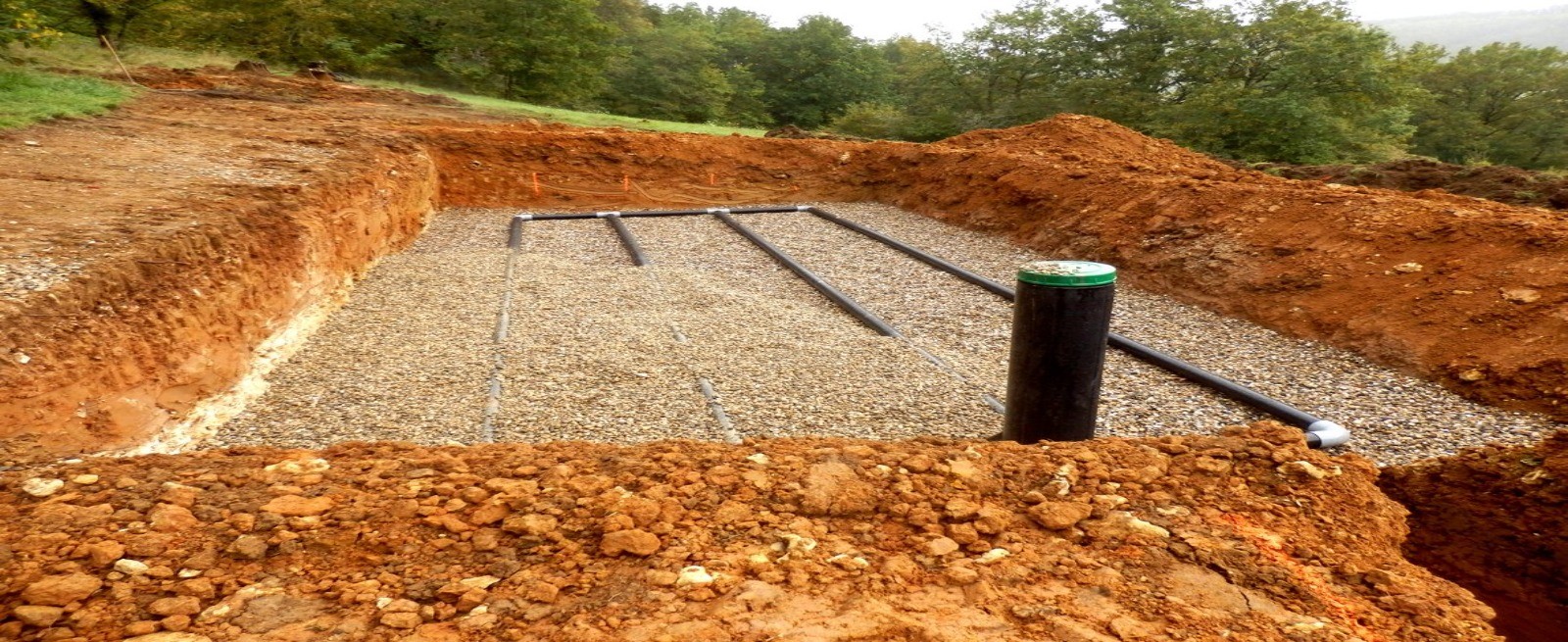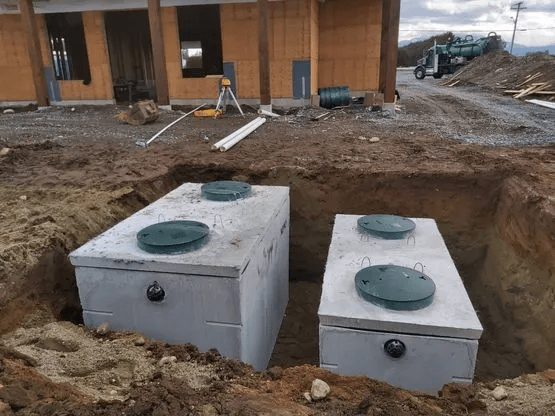When planning a septic design Fergus project, you must follow strict Ontario Building Code regulations and local permit requirements to ensure a safe, reliable, and environmentally responsible system. From soil testing and site evaluations to system selection and long-term care, every step plays a critical role. Partnering with professional engineers like Elmid Design Inc helps homeowners, builders, and developers create septic systems that pass inspections and protect property investments. This guide explains everything you need to know to design, approve, and maintain a compliant septic system in Fergus.
Septic Design Fergus and the Ontario Building Code
In Fergus, septic systems fall under Part 8 of the Ontario Building Code. This section covers design, sizing, and installation standards for properties not connected to municipal sewers. Local authorities, including Wellington-Dufferin-Guelph Public Health, review applications and issue permits. Each system must meet rules for daily design flow, tank capacity, soil absorption rates, and minimum setbacks from wells, watercourses, and buildings. Following these requirements ensures your septic design Fergus not only functions properly but also protects the surrounding environment and groundwater from contamination.
Soil Testing and Site Evaluation in Fergus
Before you design or install a septic system, you need a detailed site assessment. Soil testing measures how quickly water drains through the soil, while groundwater monitoring identifies seasonal changes that may affect system performance. In Fergus, qualified professionals perform percolation tests and dig test pits to analyze soil layers. If the soil does not drain well or if the groundwater sits too high, you may need an alternative or raised system. A proper site evaluation ensures your septic design Fergus complies with building code and performs reliably over time.
Choosing the Right System for Fergus Properties
The system type you select depends on property size, soil conditions, and expected water usage. Conventional systems with leaching beds work well in sandy soils with good drainage. However, many Fergus properties with clay soils or small lot sizes may require raised beds or tertiary treatment systems. These designs provide advanced filtration and reduce environmental impact. Choosing the correct system ensures long-term performance while meeting both provincial regulations and local health requirements. The right choice strengthens your septic design Fergus and protects your investment.
Permit Requirements for Septic Design Fergus
Every new septic installation or major repair requires a permit. In Fergus, Wellington-Dufferin-Guelph Public Health oversees permit applications, reviews site plans, and approves designs before construction begins. Your application must include soil test results, system drawings, and flow calculations. Inspectors may also visit the property before issuing approval. Missing documents or incomplete submissions delay the process. By preparing your application carefully, you can streamline approvals and avoid project setbacks. Submitting a complete package ensures your septic design Fergus moves forward smoothly without unnecessary complications.
Engineering Expertise in Fergus Septic Design
Many properties in Fergus require engineered systems, particularly when daily design flows exceed standard residential limits or when soil and site conditions are complex. Elmid Design Inc, a firm authorized by Professional Engineers Ontario (PEO), provides engineered septic solutions that meet building code requirements and environmental standards. Their team prepares permit-ready drawings, reviews site data, and recommends the best system design for your property. Working with engineers not only improves accuracy but also speeds up permit approvals. Choosing professional engineering strengthens your septic design Fergus and ensures compliance.

Costs of Septic Design Fergus Projects
The cost of septic design Fergus depends on soil type, property layout, system size, and chosen technology. A conventional residential system usually ranges from $15,000 to $30,000, while advanced or tertiary systems can exceed that range due to added treatment components. Engineering services, soil testing, and permit fees also contribute to the overall cost. Although the initial investment may feel high, proper design saves money long term by preventing failures and reducing the need for early replacements. Planning for these costs ensures your septic design Fergus delivers lasting performance.
Steps in the Installation Process
After obtaining permits, the installation process begins with excavation and tank placement. Next, contractors construct the leaching bed or raised system according to approved drawings. Inspection checkpoints follow to verify compliance with regulations and design specifications. Once the field is backfilled and graded, the system becomes operational. Working with certified installers ensures every step aligns with the Ontario Building Code. Careful sequencing in construction prevents errors and protects the soil’s natural filtration ability. Each stage strengthens the overall reliability of septic design Fergus systems.
Long-Term Maintenance for Fergus Septic Systems
Septic systems require consistent maintenance to function properly. In Fergus, tanks should be pumped every three to five years, depending on household size and water usage. Routine inspections identify early issues such as clogged pipes, cracks, or overloading of the leaching bed. Homeowners should monitor for signs of trouble like slow drains, unpleasant odors, or wet spots on the property. Addressing small issues quickly reduces long-term repair costs and protects both property and environment. Proper care extends the lifespan of your septic design Fergus and supports compliance with health standards.
Common Problems with Septic Systems in Fergus
Homeowners in Fergus often face issues such as root infiltration, soil compaction, and overloaded systems. Tree roots can damage drain lines, while driving heavy vehicles over the system can reduce soil drainage capacity. Excessive water usage also strains the tank and bed, leading to premature failure. Identifying these risks early and following recommended usage practices prevents costly repairs. With regular monitoring and timely maintenance, your septic design Fergus can avoid common system failures and continue providing safe, efficient wastewater management for decades.
Environmental Impact of Septic Design Fergus
Poorly designed or failing systems can harm the local environment by contaminating groundwater and nearby streams. In Fergus, where many homes rely on private wells, maintaining safe separation distances and proper system function is critical. A well-planned system filters wastewater through soil layers, removing pathogens and nutrients before they reach water supplies. Engineering upgrades, such as tertiary treatment, provide even higher protection. By investing in high-quality design and professional installation, homeowners ensure their septic design Fergus protects both public health and the environment.
Seasonal Care for Septic Design Fergus
Ontario winters bring unique challenges for septic systems in Fergus. Freezing temperatures can affect pipes, tanks, and leaching beds if they lack adequate soil cover or insulation. Homeowners should maintain grass cover above the system to act as natural insulation and avoid driving vehicles or heavy machinery over the field. During spring, melting snow and heavy rain increase groundwater levels, placing additional stress on the leaching bed. Preparing for seasonal changes protects your septic design Fergus from weather-related damage and ensures steady performance throughout the year.
Septic Design Fergus and Property Resale Value
A well-documented and properly functioning septic system adds significant value to rural properties in Fergus. Buyers often request inspection reports and proof of maintenance before closing a sale. Systems that meet current building code requirements and carry engineering documentation instill confidence in prospective buyers. Conversely, outdated or failing systems may lower property value or delay sales. By investing in professional design and routine care, homeowners can market their property more effectively. A reliable septic design Fergus supports both property function and long-term resale opportunities.
When to Upgrade or Replace Your System in Fergus
Every septic system has a limited lifespan, typically 20 to 30 years depending on maintenance and usage. In Fergus, older systems that fail inspections or cannot handle modern household water usage may require upgrades or full replacement. Upgrades can include expanding the leaching bed, adding tertiary treatment, or installing a larger tank. Full replacements may be necessary if the existing system no longer meets Ontario Building Code standards. Recognizing the right time to act ensures your septic design Fergus continues to perform safely and legally.
Engineering and Compliance with Elmid Design Inc
For complex sites or properties requiring advanced solutions, professional engineering plays a vital role. Elmid Design Inc, authorized by Professional Engineers Ontario (PEO), delivers septic system designs that meet Ontario Building Code requirements and local health unit standards. Their team evaluates soil conditions, prepares engineered drawings, and provides complete documentation for permit approval. Working with certified engineers ensures accuracy, efficiency, and faster approvals. Choosing Elmid Design Inc strengthens your septic design Fergus by combining technical expertise with trusted professional oversight, giving property owners confidence and compliance.
Impact of Poor Septic Design Fergus on the Environment
When a septic system is poorly designed, untreated wastewater can seep into groundwater or nearby streams. In Fergus, this contamination threatens private wells and local ecosystems, creating risks for both families and the community. Nutrients such as nitrogen and phosphorus from failing systems encourage algae growth in rivers and ponds, disrupting natural habitats. Responsible homeowners protect their property and the environment by ensuring their septic design Fergus follows strict Ontario Building Code standards and includes professional engineering input when needed.
The Role of Inspections in Fergus Septic Design
Regular inspections form an essential part of maintaining system reliability. In Fergus, inspectors from the local health unit may check designs during installation and verify compliance before final approval. Homeowners should also schedule periodic inspections after installation to detect early issues such as leaks, blockages, or soil saturation. Timely inspections reduce repair costs and extend the system’s lifespan. Including inspections as part of your septic design Fergus plan ensures long-term safety, efficiency, and peace of mind for property owners.
Future Trends in Septic Design Fergus
The future of septic design Fergus is moving toward more sustainable and advanced systems. New technology focuses on higher treatment efficiency, reduced nutrient output, and systems designed for compact or challenging sites. Tertiary treatment units and alternative filtration methods offer stronger environmental protection while meeting code requirements. As communities continue to grow around Fergus, the need for innovative septic solutions increases. Homeowners and developers who adopt these modern systems ensure compliance today while preparing for stricter environmental standards tomorrow.
Why Trust Professional Engineers for Septic Design Fergus
Designing a septic system requires precise knowledge of soil science, hydrology, and construction regulations. In Fergus, homeowners and builders benefit from partnering with Elmid Design Inc, a licensed firm with a Certificate of Authorization from Professional Engineers Ontario (PEO). Their engineers prepare detailed site evaluations, accurate system designs, and permit-ready documentation that meet all regulatory requirements. By working with professionals, property owners avoid costly mistakes and delays. Choosing certified engineers ensures every septic design Fergus project meets safety standards while protecting both property value and the environment.
Advanced Care Practices for Septic Design Fergus
A properly maintained septic system requires more than routine pumping. In Fergus, advanced care includes monitoring water usage, preventing grease buildup, and ensuring stormwater drains away from the leaching bed. Homeowners who follow these practices improve system efficiency and reduce stress on soil filtration. Seasonal checks for leaks and professional servicing of tertiary treatment units also keep systems operating at peak performance. By adopting proactive strategies, property owners extend the lifespan of their septic design Fergus and avoid costly failures that may disrupt their household.
Comparing Conventional and Advanced Systems in Fergus
Conventional septic systems work well on properties with good drainage and sufficient space. However, many Fergus properties feature clay soils, limited lot sizes, or higher groundwater tables that demand advanced systems. Raised beds, sand filters, and tertiary treatment units provide greater protection and adapt to challenging conditions. Though advanced systems may cost more, they often reduce environmental risk and meet stricter code requirements. Understanding the strengths of each system type helps property owners choose the best septic design Fergus for their land and long-term needs.
Legal Responsibilities for Fergus Homeowners
Owning a septic system in Fergus comes with legal responsibilities. The Ontario Building Code requires homeowners to maintain systems in good working order, protect against contamination, and keep records of pumping or repairs. Failure to comply may result in fines, permit issues, or orders to replace the system. When homeowners sell their property, disclosure of system age and condition becomes mandatory. Staying compliant with these rules protects public health and ensures property value. Taking ownership of these duties strengthens every septic design Fergus by aligning it with legal standards.
Why Septic Design Fergus Supports Long-Term Property Value
Septic systems represent a major investment, and their condition directly impacts property value. In Fergus, homes with well-designed, code-compliant systems sell faster and at higher prices than those with outdated or failing setups. Buyers feel reassured when provided with inspection reports, pumping schedules, and design documentation prepared by licensed engineers. On the other hand, a neglected system can lower value and create barriers to sale. Protecting property value starts with proper planning, and a reliable septic design Fergus demonstrates long-term care and responsibility to future buyers.
FAQs About Septic Design Fergus
Who approves septic system permits in Fergus?
Wellington-Dufferin-Guelph Public Health reviews septic applications, site evaluations, and design drawings before issuing permits.
How much does a septic system cost in Fergus?
Most systems range between $15,000 and $30,000, depending on soil conditions, property size, and whether advanced treatment is required.
How often should a septic tank be pumped in Fergus?
On average, tanks should be pumped every three to five years, although larger households may require more frequent service.
Can homeowners install their own septic system?
Only licensed installers registered in Ontario may legally construct septic systems. Homeowners cannot install systems without certification.
What signs show that a septic system is failing?
Slow drains, sewage odors, or wet spots near the leaching bed often indicate a failing system that requires immediate professional inspection.

Elmid Design Inc — Trusted Experts in Septic Design Fergus
Elmid Design Inc is a licensed engineering firm with a Certificate of Authorization from Professional Engineers Ontario (PEO), providing professional septic design services in Fergus and surrounding areas. Their team delivers engineered solutions that meet Ontario Building Code standards and local health regulations, ensuring safe and efficient systems. From site evaluations to permit-ready drawings, Elmid Design Inc combines technical precision with regulatory expertise. With a proven record of reliability, they remain a trusted partner for homeowners and developers seeking expert guidance in septic design Fergus.
Geographic Locations That We Service:
Our Licensed Professional Engineers specializing in Engineered Site Grading Plans offer the best-engineered site grading plan, lot grading and erosion plan, and drainage plan to obtain site plan approval and building permits in Ontario, including a wide range of municipalities. Each area boasts unique features and requirements, making our tailored approach essential for success.
Toronto and Surrounding Areas
In the vibrant heart of Ontario, we service Toronto (City of Toronto) and surrounding areas. Additionally, we cover Oshawa (City of Oshawa), Pickering (City of Pickering), and Clarington (Municipality of Clarington). Furthermore, our expertise extends to Ajax (Town of Ajax), Whitby (Town of Whitby), Brock (Township of Brock), Scugog (Township of Scugog), and Uxbridge (Township of Uxbridge).
Halton Region
Moving to the Halton Region, our services encompass Burlington (City of Burlington) and Halton Hills (Town of Halton Hills). Also included are Milton (Town of Milton) and Oakville (Town of Oakville).
Peel Region
In the Peel Region, we provide services in Brampton (City of Brampton), Mississauga (City of Mississauga), and Caledon (Town of Caledon).
York Region
Our services in the York Region cover Vaughan (City of Vaughan), Aurora (Town of Aurora), and East Gwillimbury (Town of East Gwillimbury). We also cater to Georgina (Town of Georgina), Markham (City of Markham), Newmarket (Town of Newmarket), Richmond Hill (City of Richmond Hill), Whitchurch-Stouffville (Town of Whitchurch-Stouffville), King (Township of King), and Bradford-West Gwillimbury (Town of Bradford-West Gwillimbury). Each municipality here offers a distinct setting, requiring our specialized approach.
Other Southern Ontario Cities and Towns
We also serve many other cities and towns in Southern Ontario. These include Hamilton (City of Hamilton), St. Catharines (City of St. Catharines), Niagara on the Lake (Town of Niagara on the Lake), Brant (County of Brant), Cambridge (City of Cambridge), Kitchener (City of Kitchener), Waterloo (City of Waterloo), and Woodstock (City of Woodstock). Furthermore, we operate in Guelph (City of Guelph), Centre Wellington (Township of Centre Wellington), Shelburne (Town of Shelburne), Orangeville (Town of Orangeville), New Tecumseth (Town of New Tecumseth), Essa (Town of Essa), Collingwood (Town of Collingwood), Wasaga Beach (Town of Wasaga Beach), Barrie (City of Barrie), Midland (Town of Midland), Orillia (City of Orillia), Ramara (Town of Ramara), Minden Hills (Town of Minden Hills), North Kawartha (Town of North Kawartha), Kawartha Lakes (City of Kawartha Lakes), Peterborough (City of Peterborough), Selwyn (Town of Selwyn), and Brighton (Municipality of Brighton).




